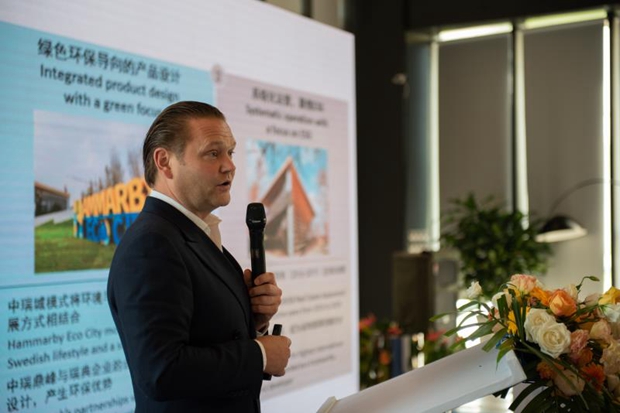
Jesper Jos Olsson, White Peak Group CEO and Founding Partner [Photo provided to chinadaily.com.cn]
As Chinese cities continue to urbanize and pursue high-quality growth, they are also seeking to minimize environmental damage, enabling citizens to enjoy a better living environment and ensuring sustainable economic growth.
Environmental, Social, and Governance (ESG) is an increasingly important trend in China for companies, the government, and other stakeholders. Sweden, a leader in ESG, and China, which is among the fastest-urbanizing countries in the world, are working together to adapt the best Swedish ESG practices to China.
White Peak, the largest European residential developer in China, hosted a forum on Sept 22 in Yantai, Shandong province and highlighted China and Sweden's cooperation in ESG and workplace safety in China's real estate sector.
"White Peak, a company with Swedish origins, is currently focusing on sustainable urban development in China," said Olsson. "Our stakeholders in Sweden and China expect adherence to the best ESG practices. We believe this is one of the keys to our continued success."
The Swedish bank SEB co-developed the Green Bond concept with the World Bank back in 2007-08, and it has been increasingly supported by China's financial regulators.
"White Peak's ESG performance has been very impressive, and SEB is proud to have supported the issuance in Sweden of our partner's green bond in 2019," said Peter Ling-Vannerus, Chief Representative in Beijing.
During the forum, representatives of companies and organizations discussed how foreign enterprises design and conduct their ESG programs in China to boost China's sustainable development goals.
"Due to China and Sweden's longstanding ESG cooperation, enterprises from both countries are being provided with more tools to implement ESG practices from top to bottom, including our Sustainable Business Toolkit," said David Hallgren, Vice President of APAC, Business Sweden.
Sustainable development and adherence to ESG practices are essential to business, the environment, and the community, said Roy Yang, ABB Vice President of the China Electrification Business Area. Bill Huang, Assa Abloy Regional Operations Director, was in agreement.

A panel discusses ESG practices with a focus on health and safety management [Photo provided to chinadaily.com.cn]
The panel also stressed "workplace safety," a key ESG issue. It is one of the labor force's most fundamental issues but has seen less discussion in many societies.
"China, in collaboration with international partners, is making significant progress in implementing ESG practices, especially in terms of safety. China's real estate sector, with White Peak as an outstanding example, is making strides in improving safety practices and education," said Dr. Fang Dongping, Professor of Tsinghua University's Department of Construction Management.
Representatives from third-party evaluation companies, Ji Chongping, President of Shanghai Pingda, and Liu Meng, Building and Facilities Division Greater China Operation Center EHS BU Manager, Bureau Veritas, stressed the importance of international collaboration in ESG and workplace safety.
"Our vision for ESG and our ESG practices, especially in terms of safety, are evolving and progressing and combining international and local experiences to ensure our projects serve as a model for sustainable development in China," said Olsson.
"We are eager to continue pursuing the best ESG practices in China."





